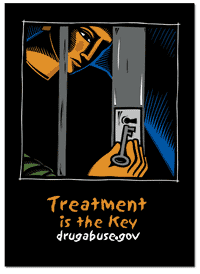What is Contingency Management?
[caption id="attachment_671" align="alignright" width="200" caption="Official National Institutes of Health Poster"]

[/caption]
Contingency Management (CM) is a program that is used in substance abuse treatment programs. It has its roots in behaviorism. The idea behind contingency management is that behavior is likely to continue if it is reinforced. In the context of substance abuse, contingency management provides either positive reinforcement based on a behavior or negative reinforcement.
One of the most important differences between contingency management programs and non-contingency management programs is the frequency of reinforcement. Enrollees in a program are tested a few times a week with an onsite urine drug test (exactly the same kind of test as our
home drug test). If they pass the test they receive a reward, perhaps a voucher to a retail store, for example. Points, prizes, and cash can also be rewards.
This is different from programs that treat may treat drug addiction simply as a disease, or utilize other methodologies in connection with medical treatment. As a supplement to therapy, Contingency Management has been shown to make the entire program more successful.
Who Supports Contingency Management?
Contingency Management is supported and promoted by the National Institute on Drug Abuse (NIDA) and SAHMSA (Substance Abuse and Mental
modafinilsmart Health Services Administration). The NIDA created a program to evaluate contingency management called “Motivational Incentives for Enhanced Drug Abuse Recovery (MIEDAR).” MIEDAR found in a study of 800 patients that at all junctures treatment combined with Contingency Management was more successful than treatment without it. 49% of the patients receiving incentives compared with 33% of the treatment as usual patients were retained at 12 weeks.
How Do You Do Contingency Management?
The approved method of contingency management is the “fishbowl method.” In this method after submitting a drug-free urine test the patient draws a slip of paper on which something is written. They then exchange it for a prize that corresponds to what is written on the paper. This method is used with some frequency but is not generally administered every day. It needs to be administered regularly and systematically.
Is Contingency Management The Answer?
Fighting addiction is a difficult process and there seems to be no one correct answer. Research continues nonetheless and contingency management is one product of the past 30 years of research. We’ll look more in-depth into this and other rehabilitation methods later on in this series.
Image at Top by
Mila Zinkova